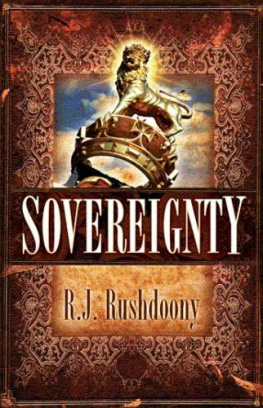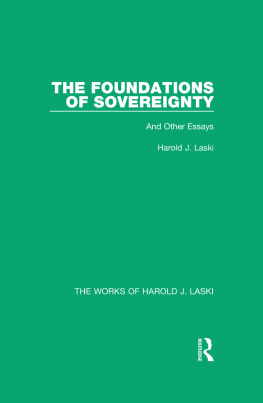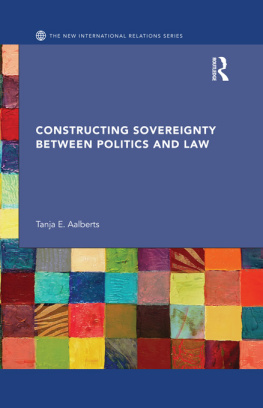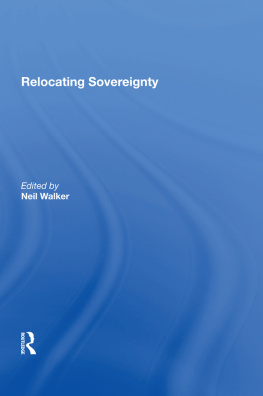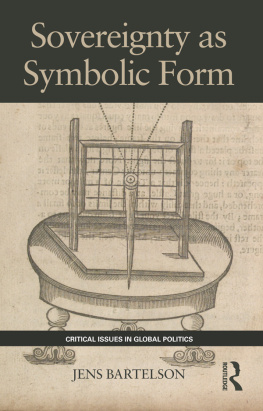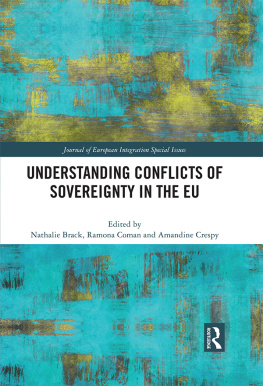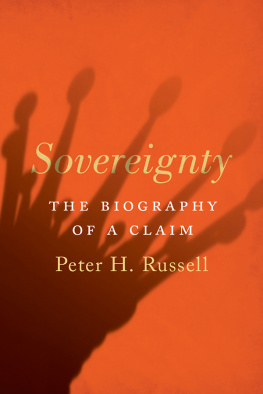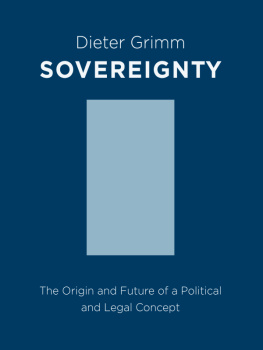Sovereignty
R.J. Rushdoony
Chalcedon/Ross House Books
Vallecito, California
Copyright 2007
Mark R. Rushdoony
Ross House Books
PO Box158
Vallecito, CA 95251
www.ChalcedonStore.com
All rights reserved.
No part of this book may be reproduced, stored in a retrieval system, or transmitted in any form or by any meanselectronic, mechanical, photocopy, recording, or otherwiseexcept for brief quotations for the purpose of review or comment, without the prior written permission of the publisher.
Library of Congress: 2007928848
ISBN: 9781879998490
This volume is dedicated to
Dr. Ellsworth McIntyre
and the staff members of
Grace Community Schools, Naples, Florida
in great appreciation
for their generous support
of the work of my father.
Rev. Mark R. Rushdoony
President, Chalcedon Foundation
Table of Contents
Foreword
Sovereignty
Sovereignty and Law
Sovereignty, Land, and Welfare
The Growing Collapse of the World of Humanism
Biblical Reconstruction
Kingship
Sin, Guilt, and Civil Government
Elitist Authority
Sovereignty and Reform
The Voice of Reason
The Source of Law
The Alternatives in Sovereignty
Priorities and Social Consequences
The Lust for Sovereignty
The New Sovereignty
Legitimacy
Congruity
Consumerism
Impersonal Sovereignty
Sovereign Insanity
Sovereignty, Rights, and Right
What is Law?
What is Justice?
Sovereignty and Justice
Government and Dominion
Lordship and Memory
Sovereignty, Power, and Dominion
Sovereignty, Order, and Justification
Justification and Justice
The Keys of the Kingdom
The Conquest of Canaan
Authority and Law
Political Atheism
Cultural Atheism
Artistic Atheism
Definitions and Sovereignty
Education and Sovereignty
Sovereignty and Dominion
Mans Law
Theocracy
The Devil Theory of Politics
Reformation in Church and State
The Civil Revolution, Part 1
The Civil Revolution, Part 2
The Civil Revolution, Part 3
The Civil Revolution, Part 4
The Civil Revolution, Part 5
The Civil Revolution, Part 6
The Civil Revolution, Part 7
The Civil Revolution, Part 8
The Civil Revolution, Part 9
The Dream of Reason
The Decline of Relevance
Justice
The Nietzschean State
Justice and Mans Determination
Poetic Justice
Justice and the Church
Law, Order, and Justice
Canon Law
Sovereign Power
Predestination and the State
St. Ambrose
Civil Donatism
The State as the Source of Grace
History: Antiquarian or Religious?
The Dying State, Part 1
The Dying State, Part 2
The Dying State, Part 3
Sovereignty and Sadomasochism
Census
The State as Church
The Pharisee State
Forgiveness and Social Order
The Lockean State
The Elite
The Revolutionary Ideology
The Locale of Sovereignty
Sovereignty and Necessity
The Goal of Sovereignty
Scripture Index
Index
Foreword
W hy is Psalm 110 so important? Because it is the Psalm most quoted in the New Testament. Its frequency of citation underscores its import: it is a powerful text.
What is the most quoted Scripture in the works of R. J. Rushdoony? Runners-up include Genesis 1:2628 (the so-called dominion mandate), Matthew 28:1820 (the Great Commission), and Proverbs 8:36 (all they that hate me love death), but there can be no question as to the most crucial text in Rushdoonys works: it is Genesis 3:5 .
Genesis 3:5 . There is no more pivotal text in a fallen world: it explains why, how, and in what direction our world fell. The entirety of redemptive history involves Gods dragging man out of the pit created by the seductive promise embodied in Genesis 3:5 . But Christendom has not only failed to learn the lessons of Genesis 3:5 , it has too often co-opted the tempters program laid out by the serpent of Eden. It is crucial to understand this one indisputable fact: the program put across by the serpent involved sovereignty .
Ye shall be as gods, knowing good and evil. Since the Hebrew Elohim appears here, there is authority for translating the serpents promise thus: Ye shall be as God. Equality with nothing less than God Himself is being extended to Eve. Unlike Christ ( Phil. 2:6 ), Eve and Adam did attempt to gain equality with God by means of robbery and preemptive seizure.
On theological grounds, the serpents promise can be put in compellingly equivalent terms: ye shall be sovereign! Satan was extending to man the promise of sovereignty, of mans lordship over himself. Lordship and sovereignty are virtually synonymous: the attributes of one are the attributes of the other. To be sovereign is to be subordinate to no one: all is subject to the sovereign, but the sovereign is beholden only to himself. Sovereignty entails possessing the authority to define, to determine the definition of all things. Rushdoony hence extends the rest of the serpents promise in light of the promised attributes of sovereignty: Ye shall be as gods, knowing [ or determining for yourselves ] what is good and evil. The explanatory phrase added in brackets captures the sense in which sovereignty defines all moral dimensions; it is an addendum consistently incorporated by Rushdoony to clue his readers in on the core issues driving modern mans mad groping after sovereignty. A true sovereign doesnt merely know what is good and evil: a sovereign can and will define it. A sovereign is the source of law; he is not subject to it .
The penchant, the inner drive, for seizing sovereignty from a transcendent God and relocating it to this world takes two fundamental forms: individuals appropriating sovereignty and the states claim to sovereignty. Rushdoony herein contrasts these two warring factions in trenchant terms:
What we have are two anarchistic would-be sovereigns, modern man, and the modern state. Two sovereigns, however, cannot coexist with any peace. As a result, both are extending their powers and their self-will. The modern state grows daily more powerful, and modern man grows daily more lawless. For sovereign man, the way of expressing his claim of sovereignty is to defy the law and will of the state. Both man and the state seek to displace God as the center . The means of attaining this role as the center of being is power . Hence the voracious hunger of the state for ever-increasing controls over every area of life and thought. (p. )
This emphasis on power is a destructive one for man, since a quest for power displaces a quest for moral order, particularly within the context of freedom and its responsibilities.
According to Lapham, Americans tend to prefer the uses of power to the uses of freedom. The emphasis on private power versus public power leads to a man-centered society, and a society in conflict. This conflict of interests is thus harmful to both the private and public sectors. Moreover, the public versus private concern is not a moral one: it is a quest for power, not for moral order. As a result, in politics, law, education, and other spheres morality is no longer a social consideration; morality at best has become a private concern. (pp. 8081 )

